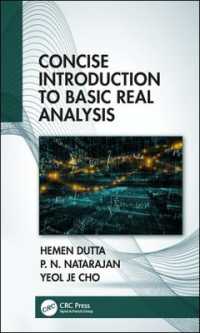- ホーム
- > 洋書
- > 英文書
- > Politics / International Relations
基本説明
Based on numerous focus-group discussions and over ten thousand interviews, this book studies economic and cultural openness from the perspective of the public in four developing or 'transitional' countries: Vietnam, (South) Korea, the Czech Republic, and Ukraine (both before and after the Orange Revolution).
Full Description
There is a vigorous debate about the merits of globalisation for developing countries. Based on numerous focus-group discussions and over 10,000 interviews, this book studies economic and cultural openness from the perspective of the public in four developing or 'transitional' countries: Vietnam, (South) Korea, the Czech Republic and Ukraine (both before and after the Orange Revolution). It finds many supporters of opening up, but also many who are discontented with its downsides and who expect states to tackle the exploitation and unfairness that accompany it. Among the most fervent enemies of openness there is support not just for peaceful public protest to tackle the problems it brings, but for violence or sabotage. The methodology provides a unique opportunity for the public in developing countries to 'speak with their own voices' about markets and openness - and highlights the subtlety, ambiguity, tensions, conflicts and emotion that statistics alone fail to capture.
Contents
1. Understanding public attitudes towards the open economy; 2. Change and discontent; 3. Public support for economic openness; 4. Public support for cultural protection; 5. Protest and resistance; 6. The role of the state; 7. The legacy of regime change; 8. The extent, nature, causes and consequences of public discontent.








